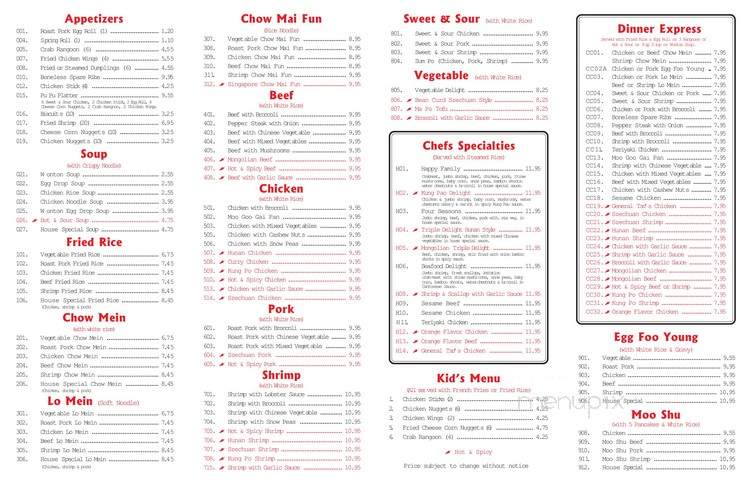

So far, they haven’t received serious inquiries to buy their restaurant. Some have reached out to see how they’re doing. Many come twice or three times a week and have frequented Great Wall for years. Great Wall customers are loyal, says Kuang. Nor did Kuang and Chen encounter xenophobia or discrimination related to the virus, though they heard of Chinese restaurant owners in New York who had. According to Kuang, Great Wall did not experience a decrease in business before closing. Summarizing why they decided to close, Kuang notes they would rather shut the restaurant down for a few months than risk being infected or transmitting the virus to others. She thought, “What if someone had the virus but was asymptomatic?” She wondered whether she could really keep her family, her workers, and her customers safe. Still, with these precautions, she felt ill at ease.
#Dragon express grand haven menu driver
Kuang told her delivery driver to be careful, wear a mask, and opt for contactless delivery.

Orders were to be paid in advance, by credit or debit card over the phone, instead of with cash. She set up a partition in the restaurant. When they tried take-out and delivery for a brief stint, Kuang says they took safety precautions to minimize interaction. She also worried about contracting the virus, especially because she and her husband wondered if the language barrier would make it difficult for them to communicate with medical personnel should they be hospitalized. “It was not like the flu,” she says, adding that she began to fear for the safety of her workers and customers. Chen told City Paper in February that he thought he would benefit from a few years off to fully recover.Īnd earlier this year, Kuang started to hear from friends and relatives in China about the dangers of the coronavirus. The couple decided to put the restaurant up for sale a few months later. He stayed in the ICU for 10 days and didn’t return to the kitchen until August. Last April, Chen was hospitalized after a cooking accident left him with burns on his face, arms, and chest. Kuang, in an interview conducted in Mandarin and translated into English, explains the decision to close was health-related. May Kuang, the wife of Chef Yuan Chen of Great Wall Szechuan House, says the Logan Circle restaurant first tried take-out and delivery before deciding to temporarily close. Some just don’t answer their phones during their regular business hours.Ĭustomers are left wondering why, especially as many of the shuttered restaurants lack a robust web or social media presence to communicate about their operations with patrons. Other places like Howard China, Chinese Dragon, Mayflower Restaurant, Grand China Carryout, Yum’s Carryout in Brightwood Park, China Boy, Da Hong Pao, Panda Gourmet, Shanghai Lounge, Dumplings & Beyond, Chalin’s Restaurant, Chinatown Garden, New Dynasty, Hunan Dynasty, Great Wall Szechuan House, and Chinatown Express have voicemails noting their reduced hours or temporary closure. Will re-open as soon as it is safe to do so. Thank you for your loyalty and please stay safe and healthy.”Īnd a sign on the door of Dragon Express in Shaw says, “We are temporarily closed due to health and safety concern over the COVID-19. Thank you and be safe.”Īt the entrance to China Town Carryout in Mount Pleasant, a sign in English and Spanish reads: “For the safety of our employees, customers and public due to the emergency related to the coronavirus, we decided to close our store for two weeks. “Due to the coronavirus we are temporarily closed until further notice,” a voice says on a recording when you dial Sichuan Pavilion downtown. And yet, some have pressed pause on operations altogether.Ī call to Hong Kong Carryout in Kingman Park yields a greeting and the message, “We are closed for the virus. Chinese restaurants, by comparison, typically have more experience in these areas. Some restaurants have had to develop new systems and change their operations to dabble in take-out for the first time. ended on-premise consumption at bars and restaurants last month, permitting only carry-out and delivery services. Local diners hoping to turn to their favorite Chinese restaurants during the COVID-19 pandemic have found them closed instead.


 0 kommentar(er)
0 kommentar(er)
